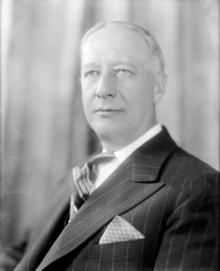Al Smith
| Al Smith | |
|---|---|
 |
|
| 42nd Governor of New York | |
|
In office January 1, 1923 – December 31, 1928 |
|
| Lieutenant |
George R. Lunn (1923–1924) Seymour Lowman (1925–1926) Edwin Corning (1927–1928) |
| Preceded by | Nathan L. Miller |
| Succeeded by | Franklin D. Roosevelt |
|
In office January 1, 1919 – December 31, 1920 |
|
| Lieutenant | Harry C. Walker |
| Preceded by | Charles S. Whitman |
| Succeeded by | Nathan L. Miller |
| 8th President of the New York City Board of Aldermen | |
|
In office January 1, 1917 – December 31, 1918 |
|
| Preceded by | Frank L. Dowling |
| Succeeded by | Robert L. Moran |
| Member of the New York State Assembly from the New York County, 2nd district |
|
|
In office January 1, 1904 – December 31, 1915 |
|
| Preceded by | Joseph P. Bourke |
| Succeeded by | Peter J. Hamill |
| Personal details | |
| Born |
Alfred Emanuel Smith December 30, 1873 Manhattan, New York, U.S. |
| Died | October 4, 1944 (aged 70) Manhattan, New York, U.S. |
| Political party | Democratic |
| Spouse(s) | Catherine Ann Dunn |
| Children | 5 |
| Religion | Christianity (Roman Catholic) |
Alfred Emanuel "Al" Smith (December 30, 1873 – October 4, 1944) was an American statesman who was elected Governor of New York four times and was the Democratic U.S. presidential candidate in 1928. He was the foremost urban leader of the efficiency-oriented Progressive Movement and was noted for achieving a wide range of reforms as governor in the 1920s. He was also linked to the notorious Tammany Hall machine that controlled New York City's politics; was a strong opponent of Prohibition, which he did not think could be enforced, and was the first Catholic nominee for President. His candidacy mobilized Catholic votes—especially of women, who had only recently received federal suffrage. It also brought out the anti-Catholic vote, which was strongest among white conservative Democrats in the South.
As a committed "wet" (anti-Prohibition) candidate, Smith attracted not only drinkers but also voters angered by the corruption and lawlessness that developed alongside prohibition. Many Protestants feared his candidacy, including German Lutherans and Southern Baptists, believing that the Catholic Church and the Pope would dictate his policies. Most importantly, this was a time of national prosperity under a Republican Presidency. Smith lost in a landslide to Republican Herbert Hoover, who gained electoral support from six southern states. Four years later Smith sought the 1932 nomination but was defeated by Franklin D. Roosevelt, his former ally and successor as New York Governor. Smith entered business in New York City and became an increasingly vocal opponent of Roosevelt's New Deal.
Smith was born at 174 South Street, and raised in the Fourth Ward on the Lower East Side of Manhattan; he resided here for his entire life. His mother, Catherine (Mulvihill), was the daughter of Maria Marsh and Thomas Mulvihill, who were immigrants from County Westmeath, Ireland. His father, Alfred Emanuele Ferraro, took the anglicized name Alfred E. Smith ('ferraro' means 'blacksmith' or 'smith' in Italian). The elder Alfred was the son of Italian and German immigrants. He served with the 11th New York Fire Zouaves in the opening months of the Civil War.
...
Wikipedia
